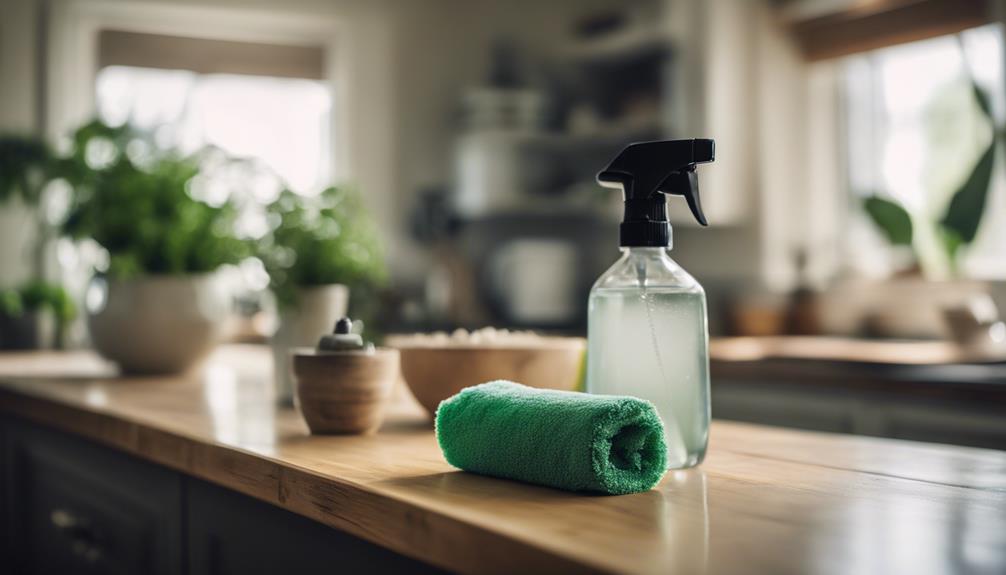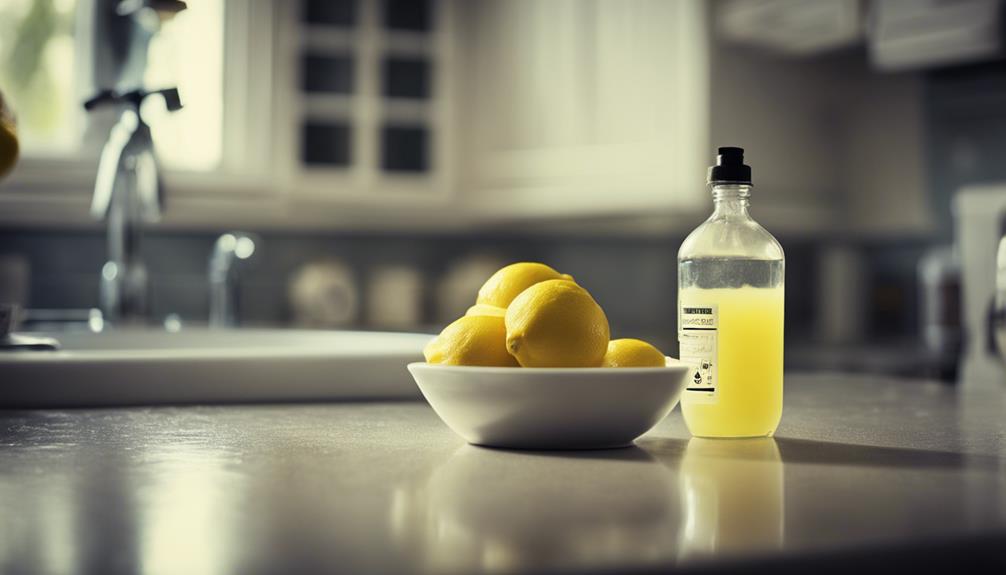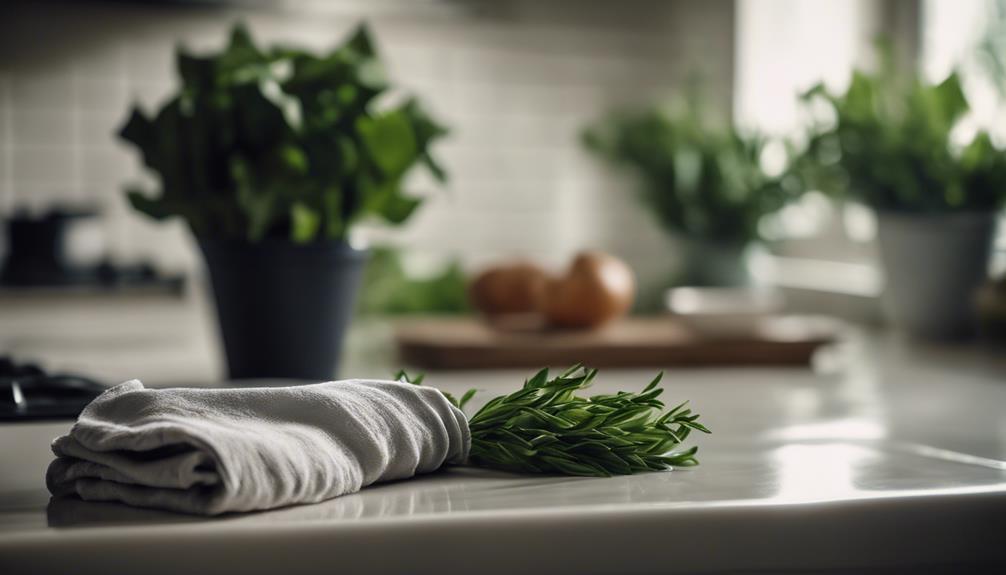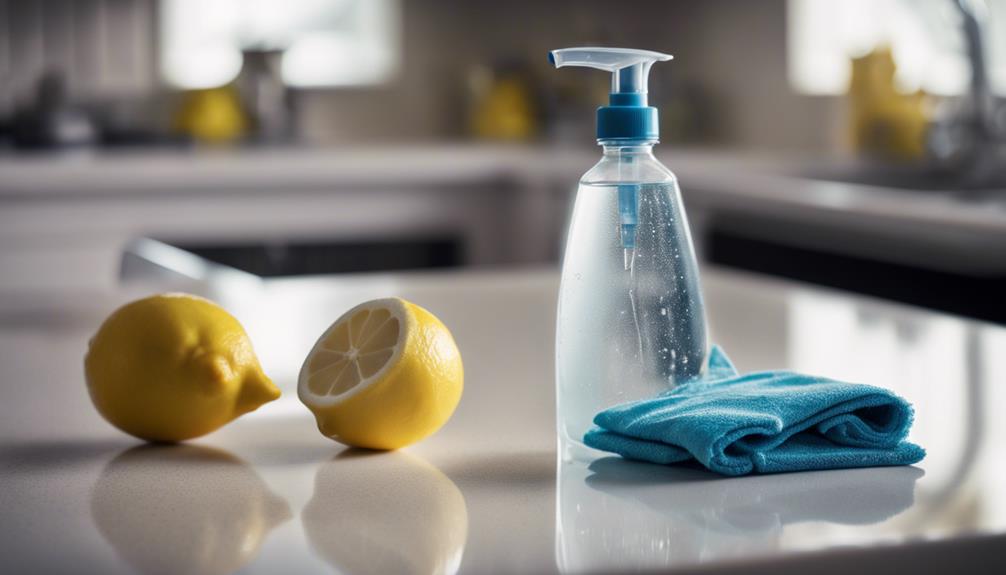You're taking the first step towards creating a healthier and more sustainable kitchen by adopting eco-friendly disinfection methods. Start by swapping harsh chemicals for natural disinfectants like white vinegar, tea tree oil, and lemon juice, which are effective against germs and bacteria. Use reusable microfiber cloths and refillable spray bottles to reduce waste. Steam cleaning is another chemical-free way to sanitize your kitchen. By making these simple switches, you'll be well on your way to a greener kitchen. As you explore more eco-friendly cleaning solutions, you'll discover even more innovative ways to keep your kitchen clean and sustainable.
Natural Disinfectants for a Greener Kitchen
Swap harsh chemical-laden disinfectants for a greener approach by stocking your kitchen with natural disinfectants like white vinegar, tea tree oil, hydrogen peroxide, thyme essential oil, and high-alcohol solutions. You'll be taking a significant step towards an eco-friendly kitchen that's not only better for the environment but also for your family's health.
Natural disinfectants are effective at killing germs and bacteria without exposing you to harsh chemicals. White vinegar, for instance, can kill E. coli and Salmonella on kitchen surfaces. Tea tree oil's antimicrobial properties make it perfect for cutting boards and countertops.
Hydrogen peroxide is a powerful disinfectant that can kill bacteria and viruses without harsh chemicals. Thyme essential oil's antimicrobial properties make it a natural disinfectant for kitchen surfaces. And, alcohol-based solutions with at least 70% alcohol content can effectively disinfect kitchen tools and surfaces.
Vinegar's Antibacterial Properties
As you explore the world of eco-friendly kitchen disinfection, you're likely to come across vinegar as a natural antimicrobial agent.
You'll discover that vinegar's acidity levels are a key factor in its ability to kill bacteria effectively.
Natural Antimicrobial Agent
You can harness the power of vinegar as a natural antimicrobial agent, leveraging its antibacterial properties to create a healthier kitchen environment.
As a natural antimicrobial agent, vinegar has been shown to be effective in killing bacteria like E. coli and Salmonella on kitchen surfaces. This is due to the acetic acid in vinegar, which disrupts the cell membranes of bacteria, inhibiting their growth and promoting disinfection.
By incorporating vinegar into your cleaning routine, you can reduce your reliance on harsh chemical disinfectants and promote a more eco-friendly cleaning approach. Vinegar-based cleaning solutions are non-toxic and sustainable, making them an attractive alternative to traditional cleaning products.
Vinegar's Acidity Levels
With its typical acidity level of around 5%, vinegar becomes a potent force against bacteria and germs on kitchen surfaces. The acetic acid in white vinegar disrupts the cell membranes of bacteria, leading to their demise.
This natural ingredient is an environmentally sustainable alternative to chemical disinfectants, making it a great addition to your eco-friendly kitchen cleaning routine.
Studies have shown that vinegar can effectively inhibit the growth of certain bacteria, such as E. coli and Salmonella. When diluted with water, vinegar can be used to clean and disinfect countertops, cutting boards, and other kitchen surfaces safely.
Its antibacterial properties make it a reliable ally in keeping your kitchen clean and germ-free.
As a natural antimicrobial agent, vinegar's acidity levels provide a powerful defense against kitchen germs. By harnessing the power of vinegar, you can create a cleaner, healthier kitchen without relying on harsh chemicals.
Killing Bacteria Effectively
Your kitchen surfaces are breeding grounds for harmful bacteria, but vinegar's antibacterial properties make it a potent ally in the fight against these germs.
Vinegar has been shown to kill a variety of bacteria, including E. coli and Salmonella, thanks to its acetic acid content. This makes it an effective disinfectant for your kitchen surfaces.
When used undiluted, white vinegar can act as a powerful disinfectant against common kitchen germs. The acetic acid in vinegar disrupts the cell membranes of bacteria, leading to their destruction.
Reusable Cleaning Essentials

As you shift towards an eco-friendly kitchen, you'll want to focus on reusable cleaning essentials that make a real difference.
You're about to discover the importance of microfiber cloths that pick up dirt and grime effortlessly, and eco-friendly spray bottles that reduce plastic waste.
Microfiber Cloths Matter
By switching to microfiber cloths, you'll not only reduce your environmental footprint but also experience a more efficient cleaning process. These reusable cloths are a game-changer for eco-friendly kitchen disinfection. Made of ultra-fine fibers, microfiber cloths trap dirt, dust, and bacteria more effectively than traditional cleaning cloths. Plus, they require less water and cleaning solutions, making them an eco-friendly option for your kitchen.
Investing in quality microfiber cloths will lead to a more hygienic kitchen environment. The small fibers create a larger surface area, allowing for more thorough cleaning and disinfection. You'll be amazed at how easily they pick up germs and contaminants, leaving your kitchen sparkling clean. And the best part? Microfiber cloths can be washed up to 500 times, reducing waste and saving you money in the long run.
Make the switch to microfiber cloths and experience the power of efficient, eco-friendly cleaning for yourself.
Eco-Friendly Spray Bottles
You can ditch single-use plastic bottles and join the eco-friendly cleaning revolution with reusable spray bottles, a simple yet effective way to reduce waste and promote sustainability in your kitchen disinfection routine. By switching to reusable spray bottles, you can take a step towards a more sustainable and environmentally-conscious approach to kitchen disinfection.
These eco-friendly spray bottles can be refilled with your homemade cleaning solutions, made from natural ingredients like vinegar, baking soda, and essential oils. Not only will you reduce waste, but you'll also save money in the long run by investing in high-quality, durable spray bottles made from materials like glass or BPA-free plastic.
This sustainable approach to cleaning will allow you to enjoy a guilt-free kitchen disinfection routine, knowing you're doing your part for the environment.
When shopping for reusable spray bottles, look for durable and long-lasting options that can withstand frequent use. With a little creativity and the right ingredients, you can create your own eco-friendly cleaning solutions and enjoy a more sustainable kitchen disinfection routine.
Make the switch to reusable spray bottles today and join the eco-friendly cleaning revolution!
Steam Cleaning for Sanitization
Steam cleaning is a powerful tool in your kitchen sanitization arsenal, effectively killing 99.9% of bacteria and germs on surfaces. You can ditch those harsh chemical-based cleaning products for a more eco-friendly approach to disinfection.
Steam cleaning uses high-temperature steam to sanitize your kitchen surfaces, making it an effective and chemical-free method for cleaning. This means you can say goodbye to toxic residues and hello to a healthier kitchen environment.
When you steam clean, you're not only killing bacteria and germs on the surface but also penetrating deep into porous surfaces, eliminating hidden bacteria in kitchen crevices. This makes steam cleaning ideal for sanitizing countertops, sinks, and tile grout.
Regular steam cleaning helps maintain a hygienic kitchen environment without harming the planet. By incorporating steam cleaning into your kitchen cleaning routine, you'll be taking a significant step towards a more eco-friendly approach to disinfection.
DIY Eco-Friendly Cleaning Solutions

When you start making your own eco-friendly cleaning solutions, you'll realize that natural ingredients make all the difference. You'll be using simple, non-toxic ingredients like white vinegar, baking soda, and lemon juice to create effective cleaning agents that are gentle on the environment.
Natural Ingredients Matter
What makes DIY eco-friendly cleaning solutions so effective is the clever combination of natural ingredients like white vinegar, baking soda, and lemon juice that pack a powerful disinfecting punch. These natural ingredients are the key to creating effective and safe cleaning solutions for your kitchen surfaces. By using them, you'll reduce your exposure to harsh chemicals and create a healthier kitchen environment.
You'll be surprised at how well these natural ingredients work together to disinfect and clean your kitchen surfaces. Many of them have antimicrobial properties, making them ideal for tackling germs and bacteria. Plus, they're cost-effective and easy to find in your pantry or at your local grocery store.
Vinegar-Based Cleaning Solutions
You can harness the power of vinegar to create a potent disinfectant for your kitchen surfaces by mixing it with water to create an eco-friendly cleaning solution. This natural disinfectant is a game-changer for maintaining a sanitary kitchen while minimizing environmental impact.
Here are just a few benefits of using vinegar-based cleaning solutions:
- Effective against germs: Vinegar is a natural disinfectant that can kill bacteria, viruses, and mold on kitchen surfaces.
- Gentle yet tough: White vinegar breaks down grease and grime, making it an effective cleaner for kitchen countertops and appliances.
- Non-toxic and safe: Vinegar is a non-toxic alternative to chemical-based cleaners, reducing harmful residues in the kitchen environment.
Non-Toxic Kitchen Cleaning Products
By switching to non-toxic kitchen cleaning products, you're not only safeguarding your health and the environment, but also establishing a safer space for food preparation. Traditional cleaning products often contain harmful chemicals that can be avoided by using non-toxic alternatives like vinegar, baking soda, and lemon juice. These natural ingredients are effective cleaning agents that reduce the impact of harsh chemicals on indoor air quality.
Plant-based cleaners are becoming increasingly popular in the market as a safer and eco-friendly option for kitchen disinfection. Using non-toxic cleaning products guarantees a healthier environment for both staff and customers in commercial kitchens.
Additionally, opting for non-toxic kitchen cleaning products contributes to a greener planet by minimizing the release of harmful substances into the environment. By making this switch, you'll be creating a safer and more sustainable kitchen space.
Reduce Waste With Microfiber Cloths

Hundreds of disposable paper towels can be eliminated from your kitchen waste with the simple switch to microfiber cloths. Not only will you reduce waste, but you'll also contribute to a more sustainable cleaning routine in your kitchen.
Microfiber cloths are reusable and can be washed and reused hundreds of times, making them a game-changer for eco-friendly cleaning.
Here are just a few benefits of making the switch:
- Microfiber cloths are highly absorbent and can pick up dust, dirt, and bacteria effectively without the need for harsh chemicals.
- They're durable and long-lasting, saving you money in the long run compared to single-use cleaning products.
- By using microfiber cloths, you'll reduce your environmental impact and contribute to a more sustainable cleaning routine in your kitchen.
The Power of Tea Tree Oil
Tea tree oil, a natural disinfectant, packs a powerful punch against germs and bacteria in the kitchen. You can harness its power by mixing a few drops with water to create a solution that's effective against a wide range of microorganisms. This eco-friendly cleaner is perfect for sanitizing kitchen surfaces like countertops, cutting boards, and sinks without exposing yourself or the environment to harsh chemicals.
As you use tea tree oil, you'll appreciate its antimicrobial properties, which make it effective against bacteria, viruses, and fungi. It's also a great tool for eliminating mold and mildew in areas prone to moisture buildup.
With its antibacterial and antifungal properties, tea tree oil is a safe and eco-friendly option for kitchen disinfection. Plus, it leaves behind an invigorating, natural scent. By incorporating tea tree oil into your cleaning routine, you'll create a germ-free environment that's not only healthy but also environmentally friendly.
Give it a try and experience the benefits of this natural disinfectant for yourself!
Kitchen Disinfection With Lemon Juice

When you combine lemon juice with water, you create a potent disinfectant solution that's not only effective at eliminating germs and bacteria but also gentle on kitchen surfaces. This eco-friendly solution is perfect for kitchen disinfection, as it harnesses the natural antibacterial properties of lemon juice to break down grease and grime.
Here are some benefits of using lemon juice for kitchen disinfection:
- The acidic nature of lemon juice helps break down tough stains and grime, making it a powerful disinfectant for kitchen countertops and cutting boards.
- Lemon juice can also help eliminate odors in the kitchen while disinfecting, leaving a fresh citrus scent behind.
- By using lemon juice, you reduce the need for harsh chemical cleaners, promoting a more eco-friendly cleaning routine.
Using lemon juice for kitchen disinfection is a simple yet effective way to keep your kitchen clean and germ-free. Plus, it's a natural and non-toxic way to disinfect, making it perfect for food preparation areas.
Give it a try and enjoy the fresh, clean scent of your eco-friendly kitchen!
Eco-Friendly Kitchen Cleaning Routines
By incorporating eco-friendly cleaning products and practices into your daily routine, you can greatly reduce your kitchen's carbon footprint and create a healthier environment for food preparation. By switching to eco-friendly kitchen cleaning products, you'll reduce your exposure to harsh chemicals and protect the environment.
Implementing green cleaning routines can help you save money while promoting a healthier kitchen environment. You can create your own natural cleaning solutions using natural ingredients like vinegar, baking soda, and citrus fruits, which effectively disinfect and clean kitchen surfaces without harsh chemicals.
To take your eco-friendly kitchen cleaning to the next level, switch to reusable cleaning tools and materials. This simple change can lead to less waste production and a more sustainable kitchen cleaning routine.
Conclusion
As you wrap up your eco-friendly kitchen disinfection routine, remember that every small change adds up. Like a single drop of oil spreading through water, your efforts will ripple out, making a significant impact on the environment.
In fact, if every household in the US replaced just one bottle of chemical-based cleaner with an eco-friendly alternative, we'd prevent 1.4 billion pounds of toxins from entering our ecosystem.
Start your ripple effect today!